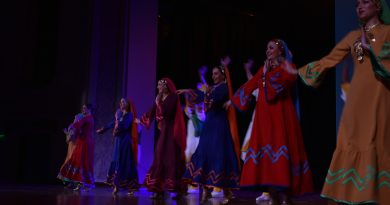Nile Project Reconnects Basin Countries
 By: Zaina Darwish
By: Zaina Darwish
Music for the ecosystem was presented through a movie screening at the “Hewar el Nile,” which translates into ‘Dialogue of the Nile,’ event hosted by the Nile Project at AUC last Monday.
“In reality, to start talking about environment we have to start from the basics. It really starts from people; from there, you can go on to environment. Music does this better than anything else,” said Mina Girgis, executive director of the Nile Project.
Girgis told the Caravan that the documentary showcased was shot during the Nile Project’s first performance that took place in Aswan. It included 18 artists from different countries of the Blue Nile, including Egypt, Ethiopia, South Sudan, Sudan and Uganda.
The selected musicians were invited to Aswan to create and perform the music in 10 days. According to the director, the aim of doing so was to allow all members to feel some sort of ownership. Instead of only rehearsing, they were producing.
“The music is the music they came up with and decided to play; this is a metaphor on how we want the Nile Basin to be,” said Girgis, adding, “In order for the Nile to be sustainable, everyone has to feel like they are heard, they have a stake and their voices aren’t compromised.”
According to their Facebook group, the Nile Project was founded two years ago to inspire and educate students in the Nile Basin to work together in order to promote the sustainability of the river and ecosystem.
As described by the director, the aim of the project is instigate cultural and environmental curiosity. He added that there is a lack of understanding regarding the environmental challenges and the kind of solutions that need to be implemented.
The project revolves around concerts along with dialogues and educational programs that help students learn more. It also includes the Nile prize competition with different themes every year, explained Girgis.
He added that music plays a specific role in the project; it is more focused on the cultural components, which is one of the biggest challenges most environmentalists do not tackle.
“It is important to be curious about the ecosystem and to think about it,” Girgis added.
The film illustrated the different stages of production. Some of the artists had the chance to give a brief about the different instruments they played and how it was related to their culture.
“I’m surprised more people don’t know about this. It’s very eye opening to most Egyptians who are becoming very used to just looking into their own issues and own perspective of things,” said Salma Abou Sina, dialogue coordinator in the core curriculum.
“We don’t realize that we have so much in common with people we think don’t share our same interests; yet, we have common backgrounds and we have a similar thing that ties us together which is the Nile basin,” added Abou Sina.
In the coming year, more musicians from the White Nile will be included with the other artists. They will be touring around the Nile Basin countries during January, February and March. They also plan on holding another event on campus next March.

